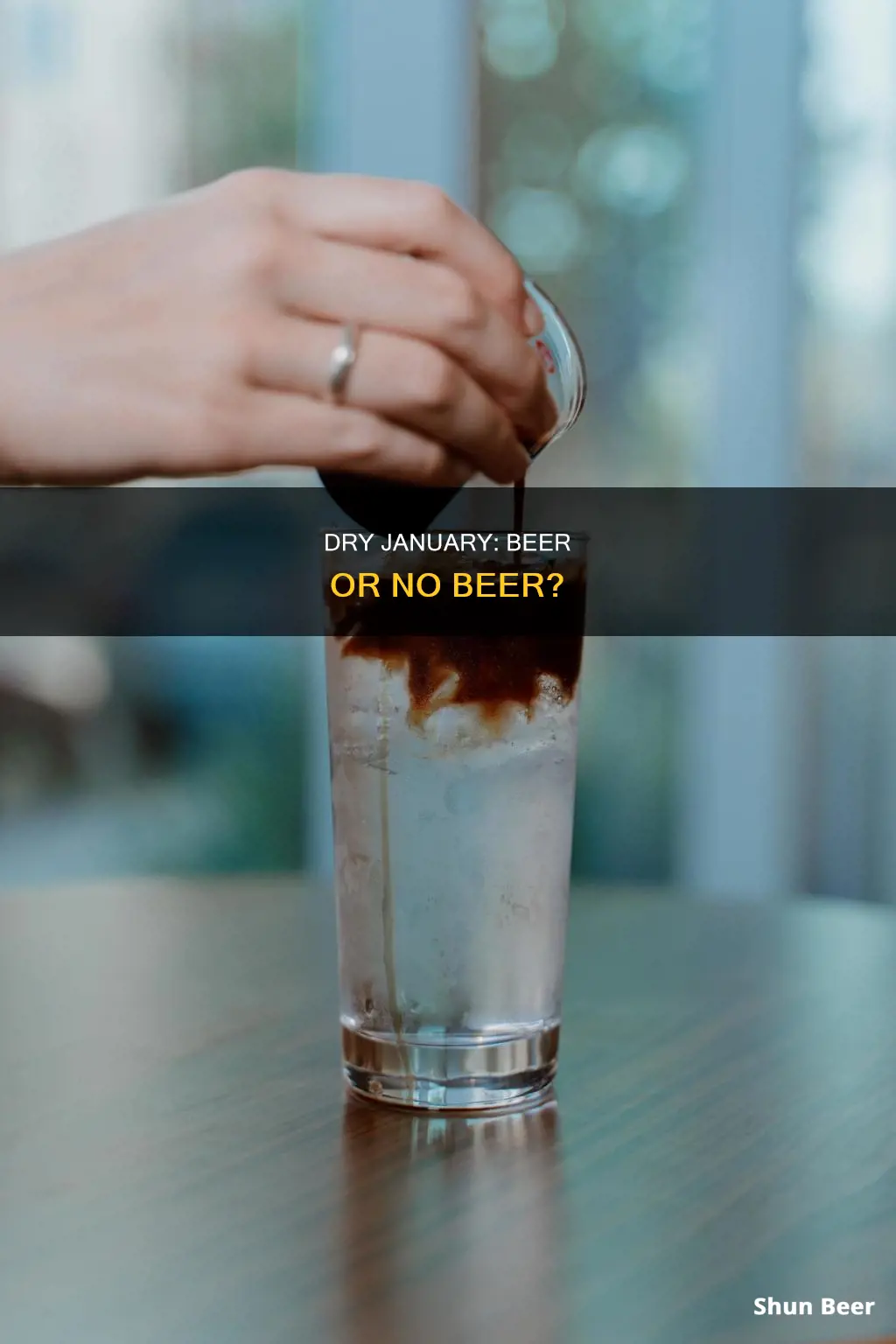
Dry January is a month-long challenge where people abstain from consuming alcohol. It began in 2012 as a public health initiative by Alcohol Change UK, a British charity, and has since gained popularity worldwide. While it can be challenging to give up alcohol, even for a short period, there are several health benefits associated with participating in Dry January. These include improved sleep, reduced anxiety, lower blood pressure, weight loss, and a reduced risk of cancer, heart disease, and liver problems. However, some people may choose to consume non-alcoholic drinks or low-alcohol beers during this period. While these drinks may not lead to intoxication, they can still provide a sense of inclusion in social situations and help individuals reflect on their relationship with alcohol.
| Characteristics | Values |
|---|---|
| Definition | A month when many people voluntarily stop drinking alcohol after the excesses of December |
| Initiator | Alcohol Change UK, a British charity |
| Initiation Year | 2012 |
| Intention | To ditch the hangover, reduce the waistline and save money |
| Health Benefits | Better sleep, reduced anxiety, lower blood pressure, reduced cancer risk, improved liver function, improved insulin resistance, weight loss, etc. |
| Participation | About 41% of U.S. adults surveyed intended to take part in Dry January 2023 |
| Success Rate | Only 16% of the participants managed to abstain from alcohol all month |
| Alcohol-Free Beer | It's OK to drink 0.5% ABV beer during Dry January as it's impossible to get drunk on beer with such low alcohol content |
What You'll Learn

It's OK to drink low-alcohol beer during Dry January
Dry January is a challenge that encourages people to abstain from drinking alcohol for the month of January. While the challenge typically involves giving up alcohol entirely, some people may wonder if it's okay to drink low-alcohol beer during this time. After all, these beverages typically contain very low levels of alcohol, often around 0.5% ABV or less. So, is it okay to indulge in a low-alcohol beer during Dry January?
The answer is yes, it is okay to drink low-alcohol beer during Dry January. Here's why:
- Everyday foods: Many everyday foods naturally contain similar amounts of alcohol as low-alcohol beers. For example, ripe bananas can have up to 0.5% alcohol, and burger rolls can contain up to 1.2%. There are also trace amounts of alcohol in condiments like malt vinegar, vanilla essence, and soy sauce. So, if you're still consuming these foods during Dry January, it's not inconsistent to drink a low-alcohol beer.
- No intoxication: It is impossible to get drunk from consuming beer with such low alcohol content. Most people start feeling the effects of alcohol when their blood alcohol content (BAC) reaches 0.04%. However, a study found that even after consuming 1.5 litres of 0.5% ABV beer in an hour, participants' BAC never exceeded 0.0056%, which is seven times lower than the typical threshold for feeling intoxicated.
- Health benefits: While completely abstaining from alcohol during Dry January can have numerous health benefits, such as improved sleep, reduced anxiety, and lower blood pressure, drinking low-alcohol beer will not significantly impact these benefits. This is because the trace amounts of alcohol in these beverages are not enough to have a noticeable effect on the body.
- Personal preference: Ultimately, the decision to drink low-alcohol beer during Dry January is a personal one. For some people, completely abstaining from alcohol may be the best choice. However, for others, allowing themselves to drink low-alcohol beer may make the challenge more manageable and help them stick to their goal.
- No "failure": According to Alcohol Change UK, the creators of Dry January, there is no such thing as "failing" Dry January. The challenge is about making positive changes and reflecting on your relationship with alcohol. If you have a drink during the month, it's not a reason to quit the challenge. Instead, view it as an opportunity to learn and be curious about the process.
In conclusion, it is okay to drink low-alcohol beer during Dry January. These beverages will not intoxicate you or significantly impact the health benefits of the challenge. However, it's important to be mindful of your reasons for participating in Dry January and to choose an option that aligns with your personal goals and comfort level.
Is Beer Safe During Pregnancy?
You may want to see also

Benefits of giving up alcohol for a month
Giving up alcohol for a month can have numerous benefits for both your physical and mental health. Here are some reasons why taking a break from alcohol can be a great idea:
Improved Sleep and Energy
Alcohol disrupts your sleep cycle, reducing the important rapid eye movement (REM) phase. By giving up alcohol, you will experience improved sleep quality, allowing you to feel more rested and energised. This, in turn, can lead to increased productivity and better emotional regulation.
Better Hydration and Skin Health
Alcohol is a diuretic, causing increased urine production and dehydration. Giving up alcohol will improve your hydration levels, which has multiple benefits for your body and brain. You will experience fewer headaches, improved concentration, and a boost in your mood. Additionally, your skin will benefit from better hydration, resulting in softer, plumper, and healthier-looking skin.
Weight Loss
Alcohol is high in calories and can contribute to weight gain. By cutting out alcohol, you can reduce your calorie intake significantly, aiding in weight loss. Additionally, alcohol irritates the stomach lining, causing issues such as reflux. Giving up alcohol will help reduce these symptoms and improve your digestive health.
Improved Liver Function
Your liver is responsible for processing alcohol into waste products, along with over 500 other tasks. By taking a break from alcohol, you give your liver a chance to recover and focus on its other vital functions. This can lead to reduced liver stiffness and a lower risk of liver disease.
Reduced Risk of Cancer and Heart Disease
Regular alcohol consumption is a major risk factor for cancer, including breast, liver, and colorectal cancers. By giving up alcohol for a month, you can reduce your risk of developing these cancers. Additionally, alcohol consumption is linked to an increased risk of heart disease. Taking a break from alcohol can help lower your blood pressure and improve your heart health.
Saving Money
Alcohol can be expensive, and giving it up for a month will save you money. This is a practical benefit that can also contribute to improved financial well-being and reduced financial stress.
Reset Drinking Habits
Taking a month off from alcohol can be an opportunity to reset your drinking habits and gain a sense of control. It can help you reassess your relationship with alcohol and make healthier choices in the long term.
Neoprene Beer Coolers: How Do They Work?
You may want to see also

Tips for a successful Dry January
Dry January, a public health initiative from Alcohol Change UK, is a challenge that involves abstaining from alcohol for the first month of the year. While it can be difficult to go a month without drinking, there are several tips that can help set you up for success.
- Set concrete goals: Establish clear and specific goals that are relevant to you as an individual. For example, instead of saying "I should stop drinking because drinking is bad," try something like, "I want to stop drinking because I know when I drink heavily, I don't get up the next morning and I don't work out."
- Share your goal with others: Informing friends or family members of your goal can help keep you accountable and motivated. You could also announce your plan on social media and invite others to join you.
- Find a substitute non-alcoholic drink: In social situations or when you crave an alcoholic drink, opt for alcohol-free beverages like sparkling water, soda, or mocktails. Non-alcoholic beer or wine can also be an option, but check the label as some brands may still contain a small amount of alcohol.
- Avoid temptations: Remove alcohol from your house and bring your non-alcoholic drinks with you when visiting others.
- Create a support group: Let your loved ones know about your intentions and encourage them to keep you accountable. Even better, enlist someone to join you in the challenge.
- Use an app: There are apps available, such as the Try Dry app, that can help you track your drinking, set personal goals, and provide motivational information.
- Don't give up: If you slip up and have a drink, don't feel guilty. Simply start again the next day and continue on your path.
- Monitor your symptoms: Pay attention to any negative symptoms you may experience from cutting back on alcohol. If you notice severe withdrawal symptoms, seek professional help.
- Journal: Track your progress and reflect on your drinking habits. Journaling can help you identify patterns and triggers and motivate you to continue.
Working with Beer Distributors: Strategies for Mutual Success
You may want to see also

What to do if you have a drink during Dry January
Dry January is a popular trend where people abstain from consuming alcohol for the month of January. It's important to note that having a drink during this period does not constitute a "failure". It is normal to experience ups and downs during this challenge, and setbacks are a part of the process. If you have a drink during Dry January, here are some things to keep in mind:
- Choose your words wisely: Instead of saying you have "failed", "relapsed", or "fallen off the wagon", try using more neutral words like "blip", "slip", or simply "had a drink". The language you use influences how you feel and think, which in turn impacts your actions.
- Avoid self-judgment: Take a step back and acknowledge your feelings without judgment. Label your emotions and be mindful of the language you use to describe yourself and your actions. Ask yourself if it is helpful or kind, and if it helps you understand your behaviour.
- Be your own best friend: Think about how you would treat a friend or a child going through the same situation. Use the same words, tone, and understanding with yourself. Making mistakes is okay, and it's all part of the learning process.
- Reflect and learn: View this as an opportunity to learn more about yourself and your relationship with alcohol. Ask yourself why you drank, what role alcohol plays in your life, and how you feel without it. This self-reflection can help you make better choices and set more realistic goals.
- Get back on track: Don't let one drink derail your entire Dry January journey. Forgive yourself, and start again the next day. Remember, it's not about perfection but about progress and behavioural shifts.
- Seek support: Talk to friends or family members who can encourage and keep you accountable. Join a support group or connect with others who are also participating in Dry January. Additionally, consider using apps like Try Dry, which can help you track your drinking and set personal goals.
- Be mindful of triggers: Identify situations or triggers that may lead to drinking. Plan ahead and have alcohol alternatives ready. Try non-alcoholic beverages like sparkling water, mocktails, or alcohol-free beers.
Remember, Dry January is about challenging yourself and making positive changes. Even if you have a drink along the way, you can still gain valuable insights and make progress toward a healthier relationship with alcohol.
Tums to the Rescue: Beer Sickness Solution?
You may want to see also

Long-term benefits of avoiding alcohol
Dry January is a month when many people voluntarily stop drinking alcohol after the excesses of December and start the new year on a sober, clearer, more refreshed, and healthy note. While it is not necessary to completely abstain from alcohol during this month, reducing alcohol consumption can have several long-term benefits.
Firstly, quitting alcohol can lead to a healthier heart and cardiovascular system. Alcohol consumption is linked to an increased risk of heart disease and other cardiovascular problems. By reducing or eliminating alcohol, individuals can lower their blood pressure and cholesterol levels, contributing to better heart health.
Secondly, avoiding alcohol can decrease the risk of developing various types of cancers. Alcohol is a carcinogen, and excessive drinking can lead to the build-up of toxic, carcinogenic compounds in the body, increasing the likelihood of cancer. Reducing alcohol intake can lower this risk, especially for cancers of the mouth, throat, liver, colon, and breast.
Thirdly, long-term alcohol avoidance can result in a healthier immune system and improved overall health. Alcohol compromises the body's ability to produce white blood cells, leading to a higher susceptibility to infections and other illnesses. By quitting alcohol, individuals may find that they get sick less often and recover more easily when they do fall ill.
Additionally, giving up alcohol can have a positive impact on mental health and well-being. Heavy drinking can lead to mood disorders, anxiety, and poor sleep. Quitting alcohol allows individuals to focus on improving their mental health, enhancing their mood, reducing anxiety, and achieving better sleep quality.
Finally, avoiding alcohol can lead to improved liver function. The liver is particularly susceptible to the harmful effects of alcohol, and excessive drinking can result in conditions such as fatty liver and alcoholic hepatitis. By quitting alcohol, the liver has a chance to recover, reducing liver damage and adding years to an individual's life.
While it may be challenging to stop drinking, the long-term benefits of reducing alcohol consumption can have a significant impact on overall health and well-being.
Beano and Beer: Does the Enzyme Work?
You may want to see also
Frequently asked questions
Technically, yes, as long as it's non-alcoholic beer. However, it's important to note that non-alcoholic beer may still contain up to 0.5% alcohol, and even everyday foods like ripe bananas can contain similar amounts of alcohol. The goal of Dry January is to take a break from alcohol and reflect on your drinking habits, so drinking non-alcoholic beer may defeat the purpose.
Dry January is a month-long challenge where people abstain from consuming alcohol during the month of January. It began in 2012 as a public health initiative by Alcohol Change UK, a British charity.
Participating in Dry January can provide various health benefits, including improved sleep, reduced anxiety, lower blood pressure, and weight loss. It is also an opportunity to reflect on your relationship with alcohol and make healthier choices.
Dry January is suitable for moderate drinkers who want to cut back on their alcohol consumption. However, it is not recommended for daily or near-daily heavy drinkers. Stopping alcohol abruptly can result in withdrawal symptoms, ranging from mild to severe.
Here are some tips to help you succeed:
- Find non-alcoholic substitutes: Opt for alcohol-free beverages like sparkling water, mocktails, or non-alcoholic beer.
- Create a support system: Let your friends and family know about your intentions and enlist an accountability buddy or join a support group.
- Stay positive: Understand your reasons for abstaining and view Dry January as a form of self-care. Don't be too hard on yourself if you slip up.







